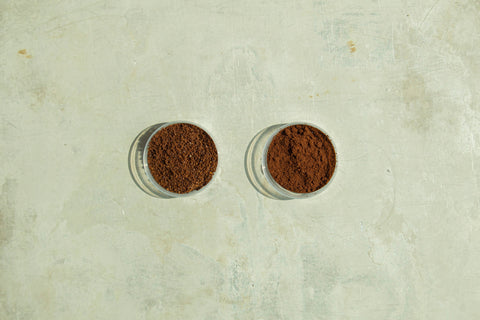Bitterness is often the first flavour we associate with coffee. For some, it's unpleasant; for others, it's part of the pleasure.
But where does this bitterness come from? Is it natural, intended, or simply the result of bad coffee? In this blog, we dive into the chemistry of coffee, the processing steps, and the sensory factors that explain why your cup can sometimes leave you with a bitter… or tasty… taste.

Bitterness: A Question of Biology and Evolution
Before talking about coffee, we need to understand what bitterness is. Biologically, bitterness is a taste perceived as a warning signal by our taste buds. Historically, it helped us detect certain toxic substances, often bitter in nature (alkaloids, tannins, etc.).
In the case of coffee, this bitterness is not toxic, but is indeed linked to specific molecules naturally present in coffee beans or created during their roasting.
Compounds responsible for bitterness

01 Caffeine
It's the most well-known alkaloid in coffee, and it contributes slightly to its bitterness. But contrary to popular belief, caffeine isn't the main culprit behind the bitter taste in a cup of coffee.

02 Chlorogenates (and their derivatives)
The real culprits are molecules called chlorogenic acids (CGAs). During roasting, these CGAs break down and form:
a ) lactones (slightly bitter)
b ) phenylindanes (very bitter)
The darker the roast, the more of these compounds are present… and the more bitter the coffee becomes.

03 Maillard products
Coffee is also rich in products of the Maillard reaction, a chemical process between sugars and amino acids during roasting. This reaction produces roasted aromas, but also some bitter compounds.

Roasting: bitterness is built up while hot
Roasting is the key moment when bitterness intensifies. A raw coffee bean is relatively mild. Heating it to over 200°C releases its aromas... and its bitter flavours.
light roast
= Less bitterness, more acidity, fruity notes.
medium roast
= Balance between sweetness, acidity and bitterness.
dark roast
= Strong bitterness, smoky and chocolatey notes.
[This is why espresso coffees, often darker roasted, are perceived as more bitter.]

Microscopic image of the taste receptors of the tongue (meb )
Infusion: too much extraction = too much bitterness
Even with excellent coffee, poor extraction technique can amplify bitterness. This is called over-extraction.
When water remains in contact with ground coffee for too long, it extracts not only the subtle aromas, but also bitter end-of-cycle compounds, such as phenylindanes.
Factors that accentuate over-extraction:
a) Coffee ground too fine
b) Water temperature too high (>96°C)
c) Infusion time too long
d) No enough water for the quantity of coffee
Methods like Chemex or Kalita, when mastered, allow for better control of extraction and reduce unwanted bitterness.

Origin and variety: not all coffees are equal
Some coffee beans are naturally more bitter than others.
01 the variety
Robusta, for example, contains more caffeine and fewer natural sugars than Arabica. It therefore produces a stronger (more full-bodied) and more bitter coffee.
02 altitude
Higher-altitude coffees are often richer in organic acids. They tend to mask bitterness with more aromatic complexity.
03 post-harvest treatments / processes
All it takes is poor drying, sloppy fermentation or a defective bean to generate unwanted aromas, including bitterness.

Well-controlled bitterness: a sensory tool
Bitterness isn't always a bad thing. In a well-balanced coffee, it adds structure and depth. This is what makes an intense espresso so charming.
Specialty roasters play with bitterness like a chef plays with the bitterness of cocoa or endive: it's about finding the right balance between sweetness, acidity and bitterness.

Conclusion: understand to better savor
If your coffee is too bitter, it's not necessarily the bean's fault. It could be the roasting process, the brewing process, or even your own taste sensitivity. By understanding the chemical and sensory mechanisms behind this complex flavor, you can learn to enjoy it... or avoid it, depending on your preferences.
At Brûlerie du Quai, we believe bitterness is a nuance, not a foregone conclusion. When used correctly, it adds character to your cup. When used poorly, it ruins the experience.
Our mission: to offer you balanced coffees, roasted with precision, to reveal the best of each bean.
Marie-Claire Marquis
Researcher




Comments (0)
There are no comments for this article. Be the first one to leave a message!